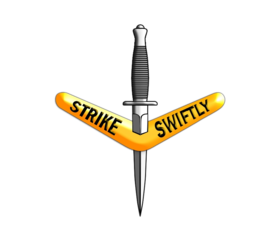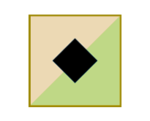1st Commando Regiment
| 1st Commando Regiment | |
|---|---|

1st Commando Regiment cap badge
|
|
| Active | 1981–Present |
| Country | Australia |
| Branch | Australian Army Reserve |
| Type | Special Forces |
| Role | Special Operations |
| Size |
One regiment
|
| Part of | Special Operations Command |
| Garrison/HQ | Sydney and Melbourne |
| Motto(s) | "Strike Swiftly" |
| March | 1 Cdo Coy – Sari Marais 2 Cdo Coy – Cockleshell Heroes |
| Engagements | Afghanistan |
| Commanders | |
| Notable commanders |
William Mac Grant Phillip Bennett Martin Hamilton-Smith |
| Insignia | |
| Unit Colour Patch |  |
| Abbreviation | 1 Cdo Regt |
One regiment
The 1st Commando Regiment (1 Cdo Regt) is an Australian Army Reserve special forces unit part of Special Operations Command with an integrated structure of regular (full-time) soldiers and reserve (part-time) soldiers, which together with the full-time Australian Army 2nd Commando Regiment, provides the Commando capability to Special Operations Command. Raised in 1955 it is the oldest unit within Special Operations Command and in 2008 deployed to Afghanistan to become the first Australian Army Reserve force element on combat operations since World War II.
The primary role of 1st Commando Regiment is to provide a scalable and deployable mission command headquarters to Special Operations Command (SOCOMD). In addition, the Regiment is manned, trained and equipped to provide commando force elements up to a company size, as well as providing high quality, competent individual commandos to round out, reinforce and rotate with other SOCOMD capabilities.
The Regiment provides Special Operations Command (Australia)|Special Operations Command]] (SOCOMD) with three key outputs: a scalable and deployable Command Control Communication and Intelligence (C3I) node, known as the Joint Special Operations Task Force – Light (JSOTF-L); Round-out, Reinforcement and Rotation (R3) for SOCOMD; and a contingency response, based upon the collective Commando and specialist capabilities organic to the 1st Commando Regiment (1 Cdo Regt).
Over the past decade, combat operations and the evolution of the commando role has changed the character of the 1 Cdo Regt. Changes were introduced to reserve training following combat operations, to align training standards with the full-time 2nd Commando Regiment (2 Cdo Regt), and to provide a higher level of readiness for the Regiment, however, this affected recruitment due to the long full-time commitment and is now optional.
Derived from the South African/Dutch word used by the Boers identifying their irregular sized raiding forces employed against the British during the South African Wars, the term "commando" was adopted by newly formed British raiding forces during World War II, and subsequently used by Australian special units raised to fight in the South-west Pacific and Indian Oceans. By the close of World War II, Australian special forces units included the Independent Companies (later Commando Squadrons), Z Special Unit under Special Operations Australia and M Special Unit under Allied Intelligence Bureau.
...
Wikipedia
